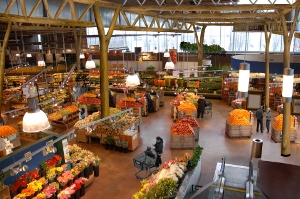Jul 25 2014
An estimated 56 million acres of national forests are critically under-managed according to the Forest Products Laboratory of the U.S. Department of Agriculture (USDA) Forest Service.
 Food store rendering (Photo: Business Wire)
Food store rendering (Photo: Business Wire)
Without management of natural waste such as fallen timbers too small to be milled, forests risk insect and disease infestation and high concentrations of fuel buildup or fire. Current international economic conditions deter such management due to low market values for small trees.
WholeTrees® Architecture & Structures, an emerging Madison, Wisconsin-based products and technology company, provides an incentive for healthy forest management by taking what would otherwise be forest waste and transforming it into a highly valued construction material.
WholeTrees has developed a proprietary manufacturing process with patent-pending structural components based on research conducted with the USDA Forest Products Laboratory and funded in part by the USDA Small Business Innovation and Research (SBIR) grant program. This process allows WholeTrees to cost effectively source and manufacture the small, unwanted portion of trees removed from routine forest thinning, such as diseased or invasive trees (called small diameter round-timber).
“Our proprietary production process and grading technologies add value to this surplus resource. WholeTrees creates a profitable relationship with trees and encourages healthy forest management,” says Amelia Baxter, president and co-founder, WholeTrees, a woman-owned business with pending Woman-Owned Business Enterprise (WBE) certification.
Life-cycle assessment (LCA) studies indicate that wood outperforms fossil fuel-intensive materials such as steel and concrete on all measures, including embodied energy; air and water pollution; and global warming. Small diameter round-timer is 50 percent stronger than heavy milled timber and as strong as steel, according to the USDA Forest Products Laboratory. Wood structures also have lower, more stable material and construction costs than steel or concrete.
According to Baxter, WholeTrees offers solutions to internationally relevant issues such as sustainable forestry, climate stabilization and habitat restoration. WholeTrees products store carbon while displacing the pollution and carbon from the use of steel and concrete. Well-managed forests increase the up-take of carbon and can diversify forest habitats.
As a Qualified New Business Venture (QNBV) through the Wisconsin Economic Development Corporation (WEDC), WholeTrees localizes the building economy by sourcing from local and urban forestry and creating local forestry manufacturing and construction jobs. WholeTrees, recognized as a tax deductible investment for state investors, ships products nationally, meeting wider market demand from the green construction industry.